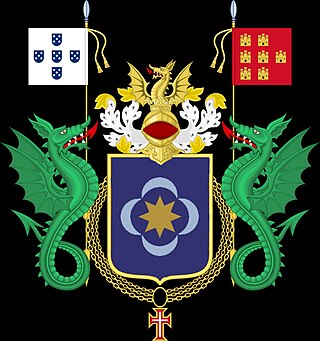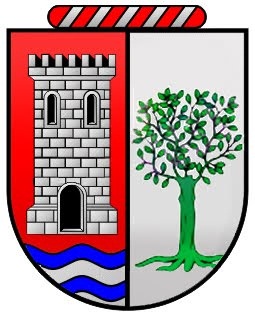Silva is a Portuguese and Galician surname widespread in the Portuguese-speaking countries, such as Portugal and Brazil. Origin: Latin toponymic silva. It is the family name of the House of Silva.
Camacho is a surname of Spanish, Portuguese or French origin. Notable people with the surname include:
Menezes, sometimes Meneses, was originally a Portuguese toponymic surname which originated in Montes Torozos, a region in Tierra de Campos, northeast of Valladolid and southeast of Palencia. The ancestor of the Meneses lineage was Tello Pérez de Meneses. The family wealth and power grew remarkably in the 13th and 14th centuries, through several marriages with the Castilian and Portuguese royal families.

Carvalho or de Carvalho, meaning 'oak', is a Portuguese surname. Origin: Celtic toponymic, from (s)kerb(h)/karb.
Santos is a Spanish surname with several variations. The English translation of Santos is Saints. A singular version, Santo, may occur. Origin: Christian, from Latin sanctus.
Ribeiro is a Portuguese and Galician surname, also common in Brazil. Origin: Latin riparius,. It is also a wine-making region of central Galicia. In Galicia the surname may have been Castilianized as Riveiro.

Morais or Moraes is a Portuguese surname.

Teixeira is a Galician-Portuguese surname based on the toponym Teixeira, derived from teixo "yew tree". The progenitors of the name were a "Noble Portuguese Marrano family, originally bearing the surname of Sampayo," and the Teixeira coat of arms was conferred "in accordance with a decree of King Philip IV of Spain" in 1643. A less frequent variant spelling is Texeira. The variant Técher is common in the highlands of Reunion Island, notably in the Cilaos area.
Oliveira is a Portuguese surname, used in Portuguese-speaking countries, and to a lesser extent in former Portuguese colonies. Origin: Latin olivarĭus (Olive-tree). In Portuguese, 'de Oliveira' may refer to both 'of the Olive Tree' and/or 'from the Olive Tree'.
Barreto is a surname of Portuguese origin, also found in the former Portuguese colonies of Brazil, Angola, Mozambique, Timor-Leste and Goa as well as Spain and Latin America. In 1786, the title of Conde de Casa Barreto was created by King Charles III of Spain and bestowed upon Jacinto Tomás Barreto of Havana, Cuba.

Sousa, Souza, de Sousa, de Souza, Dsouza or D'Souza is a common Portuguese-language surname, especially in Portugal, Brazil, East Timor, India, and Galicia. In Africa, the name is common in former Portuguese colonies, especially among people who have some Portuguese and Brazilian roots in Ghana, Togo, Benin, Nigeria, Angola, São Tomé and Príncipe, Cape Verde, Guinea-Bissau, and Mozambique.
Ferreira is a Portuguese and Galician toponymic surname, meaning "iron mine" and also the feminine of "blacksmith" ("ferreiro").
Martins is a Portuguese surname. Origin: Germanic patronymic for son of Martin, of which many variants exist in other European languages. Notable people with the surname include:
Mendes is a common Portuguese and Galician surname. Origin: Germanic patronym,.
Campos is a surname of Spanish and Portuguese origin, meaning "Fields" in both languages. Notable people with the surname include:
This page is based on this
Wikipedia article Text is available under the
CC BY-SA 4.0 license; additional terms may apply.
Images, videos and audio are available under their respective licenses.



